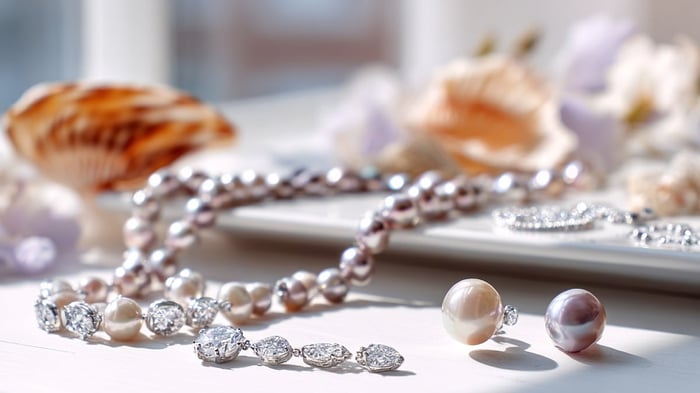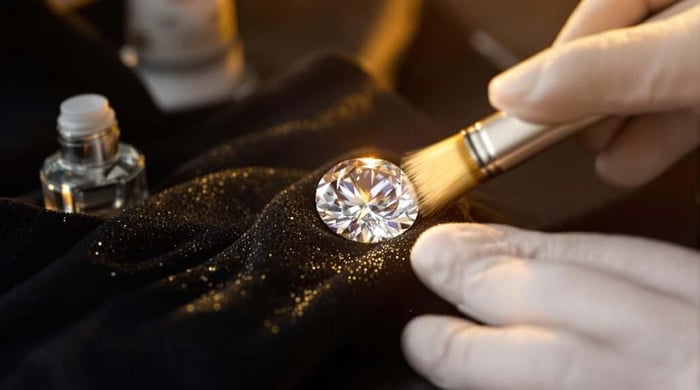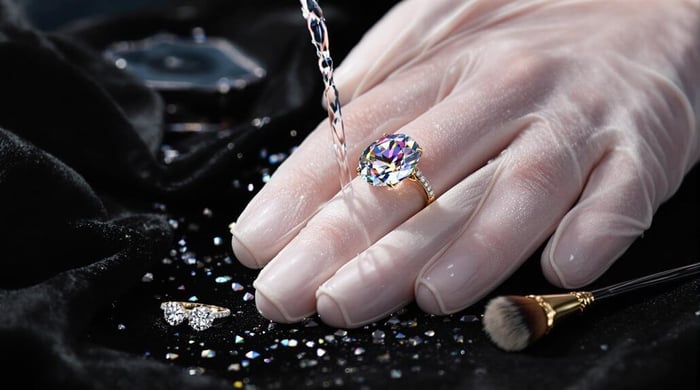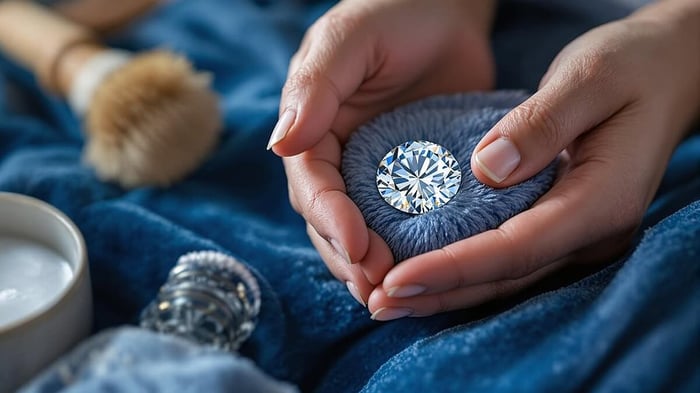In This Article
- How to Keep Your Lab-Grown Diamonds and Gemstones Looking Their Best
- Understanding Lab-Grown Diamonds
- Everyday Care for Diamond Jewellery
- Professional Jewellery Maintenance
- Caring for Other Gemstones
- Gold and Platinum Settings
- Travel and Storage Tips
- Professional Cleaning and When to Seek It
- A Modern Approach to Jewellery Care
- Keep Your Sparkle For a Lifetime
How to Keep Your Lab-Grown Diamonds and Gemstones Looking Their Best
Fine jewellery is more than just adornment. It captures memories, marks moments, and, when properly cared for, lasts for generations. Caring for diamond jewellery will reward you for a lifetime – and beyond! Whether it is a pair of lab-grown diamond studs you wear every day or a family string of pearls brought out for special occasions, each piece deserves a little thoughtful attention.
Caring for your jewellery is not difficult, but it does require understanding the materials. Diamonds may be famously hard, but they are not indestructible. Pearls and opals are beautifully fragile. Every gemstone responds differently to cleaning, storage and wear.
Here is how to care for them all so that your jewellery keeps its sparkle, lustre and meaning for years to come.
Understanding Lab-Grown Diamonds
A lab-grown diamond is chemically identical to one mined from the earth. It shares the same carbon crystal structure, hardness and brilliance. The only difference lies in origin: a laboratory rather than deep underground. That means cleaning and care are identical for both.
Lab-grown diamonds are rated at 10 on the Mohs scale of hardness, making them the most durable gemstone in existence. However, while they resist scratching, they can still collect oil, soap residue and microscopic debris that dulls their surface.
A diamond’s beauty comes from light entering and reflecting through its facets. When grime builds up, that sparkle diminishes. Regular cleaning keeps it clear and bright.
Isla Pink Lab Oval Diamond Halo Engagement Ring 1.00ct in Platinum
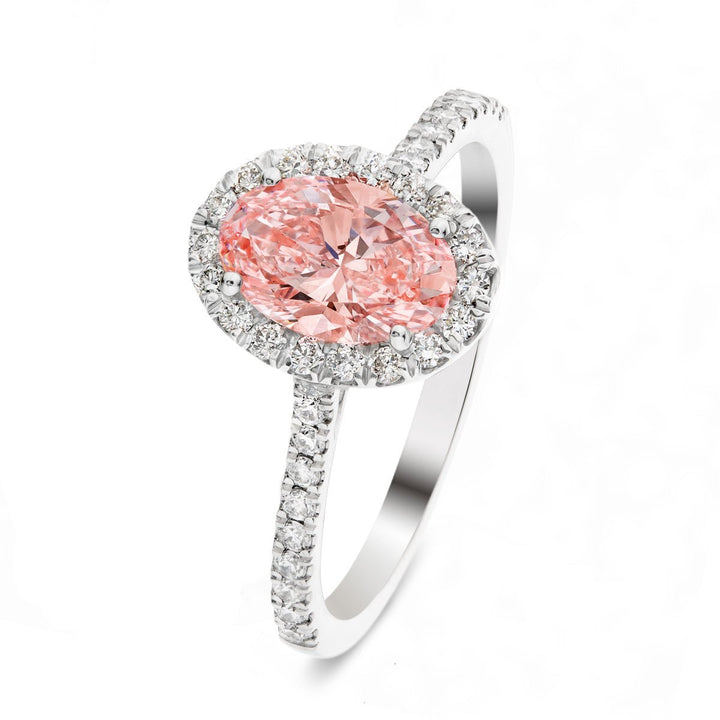
£1,083.00
£2,275.00
The Isla Pink Lab Oval Diamond Halo Engagement Ring is a breathtaking creation that combines vivid colour with classic elegance. A 0.50ct oval lab-grown pink diamond at its heart boasts a VS quality clarity that radiates unmatched brilliance. This exquisite… read more
Everyday Care for Diamond Jewellery
Remove jewellery when cleaning, gardening or exercising. Diamonds may be tough, but metal settings can bend or loosen.
Wipe with a soft lint-free cloth after each wear to remove natural oils from the skin.
Store separately to avoid scratching softer gemstones. A lined jewellery box with divided compartments or soft pouches works best.
When cleaning at home, use warm water with a mild detergent such as unscented washing-up liquid. Soak the piece for a few minutes, then gently brush with a soft toothbrush. Rinse thoroughly and pat dry.
Avoid harsh chemicals such as bleach or chlorine, which can damage gold alloys and loosen settings. Ultrasonic cleaners are safe for solid diamonds, but not for treated or fracture-filled stones. When in doubt, a professional jeweller can clean and check your setting safely.
Browse Real Diamond Jewellery Today
Professional Jewellery Maintenance
Every piece of diamond jewellery will benefit from a professional inspection at least once a year. A skilled jewellery technician will ensure that the item can be repolished, checked for loose stones, and professionally cleaned to restore its full brilliance.
Over time, even small abrasions or metal fatigue can compromise a setting. Early detection prevents damage and loss. Consider an annual cleaning and inspection as part of your jewellery’s long-term care routine, much like a service for a fine watch.
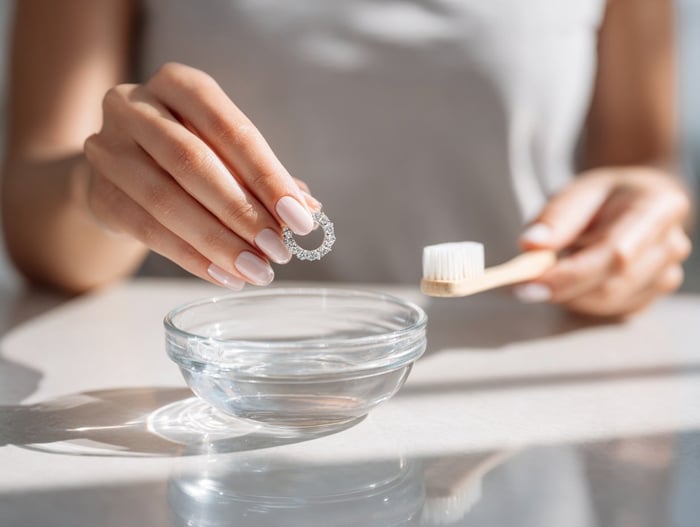
Caring for Other Gemstones
Diamonds may set the standard for durability, but other gemstones each have their own sensitivities. Pearls and opals, in particular, demand extra care because they are porous and delicate. Understanding these differences helps prevent accidental damage.
The following table summarises how to clean and store various gemstone types safely:
Isla Blue Lab Oval Diamond Halo Engagement Ring 1.00ct in 18k Yellow Gold

£1,063.00
£2,085.00
The Isla Blue Lab Oval Diamond Halo Engagement Ring is a stunning symbol of love, crafted with meticulous attention to detail. At its heart lies a vivid blue, VS quality lab-grown diamond weighing 0.50ct and certified by IGI for its… read more
Gemstone Care Guide
| Gemstone | Cleaning Method | Avoid | Storage Tips |
|---|---|---|---|
| Lab-Grown or Natural Diamonds | Warm water, mild detergent, soft brush | Harsh chemicals, bleach, rough handling | Store separately in fabric-lined box or pouch |
| Pearls | Wipe with soft damp cloth after wear; mild soap only if necessary | Immersion in water, ultrasonic cleaning, perfume, hairspray | Store flat in soft cloth; avoid plastic bags |
| Opals | Wipe gently with damp cloth; use minimal moisture | Prolonged heat, dry air, ultrasonic cleaning | Store wrapped in damp cotton inside plastic bag to prevent dehydration |
| Emeralds | Lukewarm water, mild soap, very soft cloth | Ultrasonic cleaning, alcohol, hot water | Store individually; avoid knocks and pressure |
| Sapphires and Rubies | Warm water, mild detergent, soft brush | Extreme heat, sudden temperature change | Store separately to avoid scratching softer stones |
| Amethyst, Topaz and Quartz | Warm water, mild soap, soft cloth | Ultrasonic cleaning, sunlight exposure | Store away from heat and direct sunlight |
Pearls: A Lesson in Gentle Care
Pearls are organic gems formed within oysters and molluscs, composed of calcium carbonate layers that give them their signature lustre. Because they are porous, they can absorb perfumes, oils and acids that dull their sheen.
To keep pearls luminous:
Always apply perfume, hairspray and moisturiser before putting them on.
Wipe them gently with a damp cloth after each wear to remove perspiration and residue.
Avoid storing them in sealed plastic bags, which can dry them out. Instead, use a soft silk or velvet pouch.
If your pearls are strung, have them re-strung every 12 to 18 months to prevent breakage. Knotting between each pearl also prevents them from rubbing together.
A well-cared-for strand can last decades and even improve with wear, as skin oils keep pearls supple and glossy.
Heart Necklace Pendant Lab Diamond 0.40ct In 9K Rose Gold
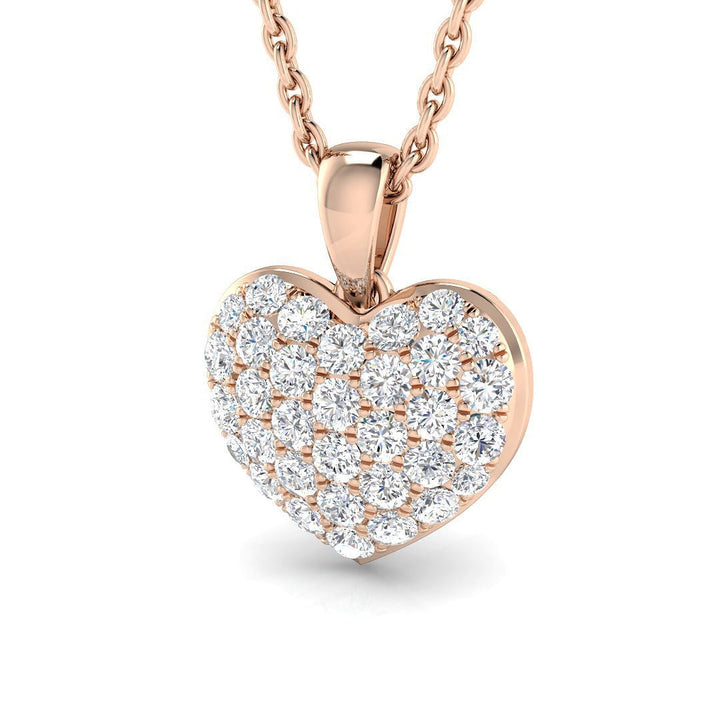
£505.00
£965.00
This exquisite Heart Necklace Pendant features lab-grown diamond of 0.40ct total weight, boasting a D/VVS quality that radiates unparalleled clarity and brilliance. The perfectly round-cut diamonds, are gracefully set in 9K rose gold, lending a warm, romantic hue to the… read more
Opals: Beauty with Sensitivity
Opals are among the most mesmerising gemstones, with flashes of colour that shift under changing light. Their unique composition, however, makes them sensitive to temperature and humidity.
Opals contain up to 10% water. When exposed to heat or very dry air, they can lose moisture and develop cracks, known as crazing. To protect them:
Store opals in a slightly humid environment, wrapped in damp cotton wool within a plastic bag.
Never leave them near heating vents or windowsills.
Clean gently with a soft damp cloth and avoid soaking or ultrasonic cleaning.
Because lab-grown opals share the same structure as natural ones, these guidelines apply to both.
Emeralds, Sapphires and Rubies
These gems are harder than pearls and opals but still benefit from gentle handling. Emeralds, in particular, often contain natural inclusions and internal fractures, making them susceptible to damage. Many emeralds are oiled to enhance clarity, so avoid heat or solvents that could remove the oil.
Sapphires and rubies, both forms of corundum, are second only to diamonds in hardness. They are durable but not immune to scratching, especially when stored with other stones. A separate soft pouch prevents contact and preserves polish.
Gold and Platinum Settings
While gemstones often draw the eye, the metal settings deserve equal care. Gold, especially 18-carat, can scratch or bend if knocked against hard surfaces. Platinum is stronger but still benefits from occasional polishing to maintain shine.
To clean metal settings, use the same mild soap solution recommended for diamonds. Avoid toothpaste or abrasive cleaners that can wear away the surface. If your jewellery includes multiple materials, always clean for the softest element first.
For example, a ring with both pearls and diamonds should be cleaned according to the pearl’s requirements.
Nancy Lab Diamond Halo Pear Engagement Ring 2.75ct G/VS in Platinum
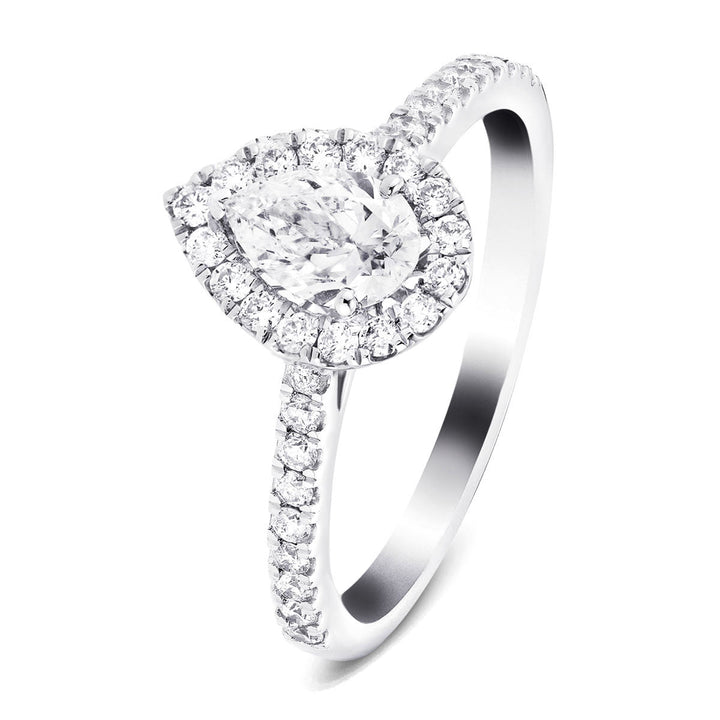
£2,386.00
£4,556.00
The Nancy Lab Diamond Halo Pear Engagement Ring is a true treasure to cherish forever, crafted by hand in the UK to capture the beauty of your love. This ring features a captivating 2.75-carat total weight of G/VS-graded diamonds, including… read more
Travel and Storage Tips
Proper storage keeps jewellery safe between wears. Here are a few practical habits:
Use a dedicated jewellery box with individual compartments. If travelling, pack items in soft pouches or wrap each in a microfibre cloth.
Never toss jewellery together in a bag or drawer; stones can chip or scratch one another.
Keep pieces away from extreme temperatures or direct sunlight for prolonged periods.
When flying, avoid storing jewellery in checked luggage. Carry it in hand luggage or wear the simplest items.
These small precautions make a significant difference over time.
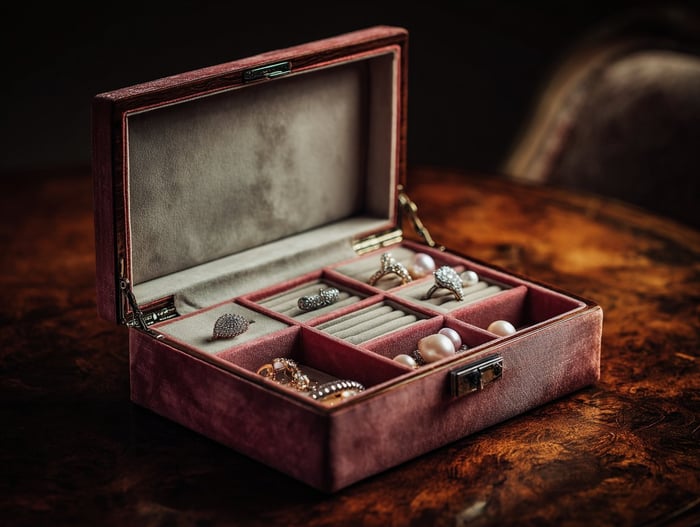
Professional Cleaning and When to Seek It
If your jewellery has lost its sparkle even after gentle home cleaning, it may need professional attention. Jewellers use ultrasonic and steam equipment that removes residue from behind settings and between small pavé stones.
It is wise to visit a jeweller if:
Stones appear loose, or settings feel rough to the touch.
You notice discolouration or film that cannot be removed with mild soap.
Pearls or opals have developed fine cracks or dryness.
Professional cleaning services designed for lab-grown diamond jewellery, as well as mixed-material pieces containing other gems, are worth using. Regular professional care extends lifespan and ensures each piece continues to look as radiant as the day it was purchased.
20ct Lab Diamond Tennis Necklace D/VVS Quality in 18k Yellow Gold
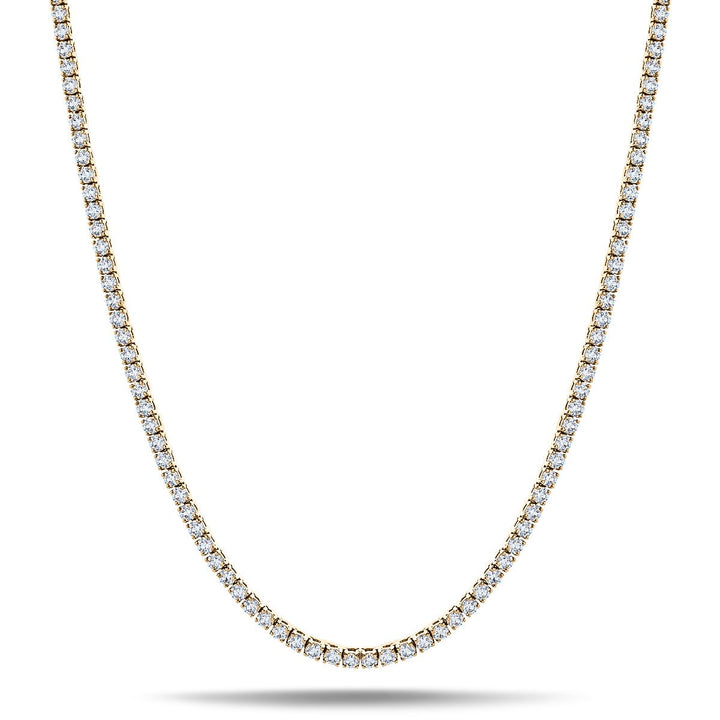
£8,874.00
£16,700.00
Crafted with impeccable attention to detail, this exquisite tennis necklace boasts 20ct of lab-grown round diamonds of D/VVS quality. Set in lustrous 18k yellow gold, these sparkling diamonds deliver a sense of sophistication. As a UK handcrafted and hallmarked piece,… read more
A Modern Approach to Jewellery Care
Caring for diamond jewellery today is as much about awareness as it is about tradition. The rise of lab-grown diamonds and responsibly sourced materials has encouraged a more mindful attitude toward maintenance. Ethically crafted pieces demand care that aligns with their intended longevity.
Simple habits such as gentle cleaning, proper storage, and periodic inspection help preserve not only appearance but also sentiment. Every ring or necklace carries a story, and each polish keeps that story alive.
Fine jewellery does not have to be fragile, but it does require kindness. Respect your diamonds, pearls, and gems, and they'll reward you with beauty for years.
Keep Your Sparkle For a Lifetime
Explore After Diamonds’ collection of lab-grown diamond jewellery, crafted for modern living and designed to be as enduring as your memories.


